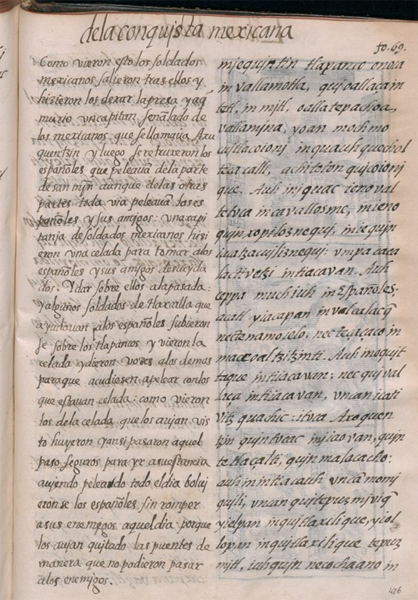Folio 69 recto
Translations and Transcriptions
Spanish Translation
[Translation of the Nahuatl into Spanish by Fr. Bernardino de Sahagún; transcription of the Spanish (left-hand column) by James Lockhart:] [f. 69r.] Como vieron esto los soldados mexicanos salieron tras ellos y hizieronlos dexar la presa y aq̓ murio vn capitan señalado de los mexicanos que se llamaua Axuquentzin y luego se retruxeron los españoles que peleauā de la parte de san m̄īn aunque de las otras partes todavia peleauā los españoles y sus amigos: vna capitania de mexicanos hizieron vna celada para tomar a los españoles y sus amigos descuydados. Y dar sobre ellos a la pasada: y algunos soldados de Tlaxcalla que ayudauan a los españoles subieronse sobre los tlapancos y vieron la celada y dieron vozes a los demas para que acudiesen a pelear con los que estauan celada:* como vieron los de la celada que los auian visto huyeron y ansi pasaron aquel paso seguros para yr a su estancia auiendo peleado todo el dia boluieronse los españoles sin romper a sus enemigos aquel dia porque los auian quitado las puentes de manera que no podieron pasar a los enemigos. ---------- *CELADA. In normal usage, something on the order of "en" should precede this word.
English Translation
[Translation of the Nahuatl (right-hand column) by James Lockhart:]
Many [warriors] who were on the roofs hurled down stones and arrows, stoning and shooting arrows from there, and they made holes in all the houses of the Quauhquechollan people, breaking out little holes. And when the horse[men] were pursuing people and trying
Analytic Transcription
[Transcription of the Nahuatl (right-hand column) by James Lockhart:] [f. 69r.] miequintin tlapanco onoca in vallamotla, quioallaça in tetl, in mitl, oallatepachoa, vallamina, yoan moch mocuitlacoioni in quauhquecholtecacalli, achitoton quicoionique. Auh in iquac ie no valtetoca in cavallosme, in ie no quinxopiloznequi, in ie quiniacatzacuiliznequi: vmpa cacalacti vetzi in tiacavan. Auh ceppa muchiuh in Españoles: acatl yiacapan in valcalacq̄ nec tenamoielo, nec teçaçaco in maceoaltzitzinti. Auh in oquittaque in tiiacavan: nec quivallaça in tiiacavan, vncan icativitz quachic: itoca Axoquentzin quintocac in iiaovan, quintetlaçalti, quinmalacacho: auh inin tiacauh vncā momiquili, vncan quitepuzmiviq̄ yielpan, in quitlaxilique, yiollopan in quitlaxilique tepuzmitl, iuhquin necochaano in
Image

Spanish Translation
[Translation of the Nahuatl into Spanish by Fr. Bernardino de Sahagún; transcription of the Spanish (left-hand column) by James Lockhart:] [f. 69r.] Como vieron esto los soldados mexicanos salieron tras ellos y hizieronlos dexar la presa y aq̓ murio vn capitan señalado de los mexicanos que se llamaua Axuquentzin y luego se retruxeron los españoles que peleauā de la parte de san m̄īn aunque de las otras partes todavia peleauā los españoles y sus amigos: vna capitania de mexicanos hizieron vna celada para tomar a los españoles y sus amigos descuydados. Y dar sobre ellos a la pasada: y algunos soldados de Tlaxcalla que ayudauan a los españoles subieronse sobre los tlapancos y vieron la celada y dieron vozes a los demas para que acudiesen a pelear con los que estauan celada:* como vieron los de la celada que los auian visto huyeron y ansi pasaron aquel paso seguros para yr a su estancia auiendo peleado todo el dia boluieronse los españoles sin romper a sus enemigos aquel dia porque los auian quitado las puentes de manera que no podieron pasar a los enemigos. ---------- *CELADA. In normal usage, something on the order of "en" should precede this word.
English Translation
[Translation of the Nahuatl (right-hand column) by James Lockhart:]
Many [warriors] who were on the roofs hurled down stones and arrows, stoning and shooting arrows from there, and they made holes in all the houses of the Quauhquechollan people, breaking out little holes. And when the horse[men] were pursuing people and trying
Analytic Transcription
[Transcription of the Nahuatl (right-hand column) by James Lockhart:] [f. 69r.] miequintin tlapanco onoca in vallamotla, quioallaça in tetl, in mitl, oallatepachoa, vallamina, yoan moch mocuitlacoioni in quauhquecholtecacalli, achitoton quicoionique. Auh in iquac ie no valtetoca in cavallosme, in ie no quinxopiloznequi, in ie quiniacatzacuiliznequi: vmpa cacalacti vetzi in tiacavan. Auh ceppa muchiuh in Españoles: acatl yiacapan in valcalacq̄ nec tenamoielo, nec teçaçaco in maceoaltzitzinti. Auh in oquittaque in tiiacavan: nec quivallaça in tiiacavan, vncan icativitz quachic: itoca Axoquentzin quintocac in iiaovan, quintetlaçalti, quinmalacacho: auh inin tiacauh vncā momiquili, vncan quitepuzmiviq̄ yielpan, in quitlaxilique, yiollopan in quitlaxilique tepuzmitl, iuhquin necochaano in
Image
